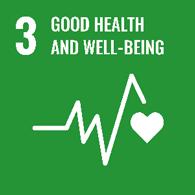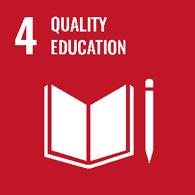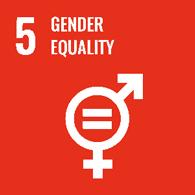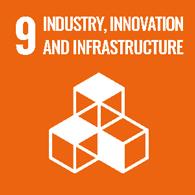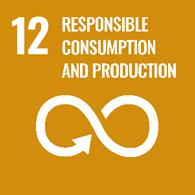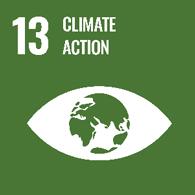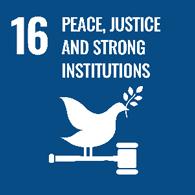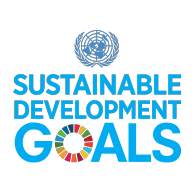UN Goal 8 - Decent work and economic growth
Breadcrumb
Child page UN Goal 8
Introduction UN Goals
In 2015, under the aegis of the United Nations, the international community adopted Agenda 2030. It lays out 17 global goals together with the call to implement measures to achieve those goals. In particular, the Sustainable Development Goals No Poverty, Health and Well-being, Quality Education, Gender Equality, Decent Work and Economic Growth, Industry, Innovation and Infrastructure, Resonsible Consumption and Production, Climate Action and Peace, Justice and Strong Institutions are of great importance to Messer. Both global and local projects and activities, as well as initiatives supported by Messer, contribute to various sustainability goals. The individual projects contribute to long-term improvement and can be viewed here:
Accordion UN Goal 8
Acquisition of parts of Linde’s and Praxair’s American business
Messer Group acquired the majority of Linde AG’s gases business in North America and certain Linde and Praxair business activities in South America effective March 1, 2019 in a joint venture – called Messer Industries GmbH – with CVC Capital Partners Fund VII (“CVC”). Messer Industries invested a total of around 3.6 billion US dollars (3.2 billion euros). Messer Group contributed the majority of its Western European companies to the joint venture. Over the course of the next few years, the joint venture will be fully integrated into the family-run Messer Group, thereby establishing a global gas group under the leadership of the Messer family. Messer Group’s regional operations are currently focused in Eastern Europe and Asia. Asia already represents the largest industrial gases market and is expected to have the highest growth rate in the medium term. Also with Messer Industries’ participation, in 2019 strategies were developed for the Americas and Western Europe, in order to sustain business success in the coming years. The common aim that they all share is to achieve safety, customer focus, profitable growth and fair payment for our products through a team culture focused on efficiency, success and motivation in combination with innovation and a highly satisfied workforce and clientele.
Germany : Cornerstone for new air separator
In June 2019, the cornerstone was laid for Messer’s third air separation unit in Germany. Together with the gas manufacturer basi Schoberl, Messer is investing some 32 million euros in the production of oxygen, nitrogen and argon. Construction on the grounds of SAINT-GOBAIN ISOVER G+H AG in Speyer is scheduled for completion in spring of 2020. Messer has already been supplying gases to the customer by trailer since May 2019. In the near future, the new on-site air separation unit will minimize those gas shipments and the accompanying carbon footprint.
Hungary: Investments reinforce market position
In the period from 2017 to 2019, Messer invested 37 million euros to build up its Hungarian market. With gas production units and plants at twelve major customers, Messer is the market leader in the on-site atmospheric gases business in Hungary. In 2019, Messer signed an agreement with MOL Petrochemicals, a leading petrochemical group, for the construction of a new onsite unit to supply nitrogen and instrument air for a new polyoil complex in Tiszaújváros in northern Hungary. When the unit goes into operation in 2021, it will be one of Messer’s largest on-site units in southeastern Europe. Messer also built two new nitrogen generators in Hungary – one in Dunavarsány and one in Hatvan – and a third one is currently under construction. In response to the growing demand, the construction of two additional CO2 plants has tripled the utilization capacity of the carbon dioxide field near Ölbő, Hungary, over the past two years.
Switzerland – Once again awarded the “Credit Rating Certificate”
In 2020, the credit agency Bisnode D&B Schweiz AG granted Messer in Switzerland a “Credit Rating Certificate” with “Risk Indicator 1” (which stands for minimum default risk) for the tenth consecutive time. Only two percent of all companies in Switzerland meet the requirements for that best category. The certificate sets Messer in Switzerland apart as a trustworthy, reliable, financially healthy and stable business partner. Bisnode D&B is a partner in the network of Dun & Bradstreet, the world’s largest service provider for business-to-business economic data.
China: Growth driver for the Messer Group
In 2019, Messer achieved another breakthrough in the electronics industry and put gas supply plants into operation in Sichuan at Truly and BOE for, among other things, high-purity nitrogen. BOE and Truly are leading companies in the electronics market in China. In addition, Messer China signed a supply contract for ultra-high-purity industrial gases with HKC Mianyang Photoelectric Technology Co., Ltd. HKC is a leading supplier of large-format LCD displays. In March, another CO2 recovery unit of Messer China began producing food-grade CO2. Located on the grounds of Yunnan Dawei Ammonia Producing Co., Ltd., it is Messer’s fourth CO2 unit in China and its second in Yunnan Province. Through purification and liquefaction, it converts the excess carbon dioxide generated by Dawei’s production process into quality products for use in food, pharmaceuticals, and industrial and agricultural applications
In September, Messer China laid the cornerstone for another air separation unit and a condenser in Hunan Province.
In October, a second air separation unit and a condenser were put into operation in the central Chinese city of Chongqing. The new capacity makes Messer the leading supplier of liquefied atmospheric gases in Chongqing and now also enables us to supply gas via pipeline to other industrial customers and chemical companies in the chemical park.
Vietnam: Significant growth in the steel and electronics sectors
In 2019, Messer put two new air separation units into operation to supply industrial gases to a new Hoa Phat steelworks in Dung Quất, Quảng Ngai Province. That makes Dung Quất one of our company’s largest production sites in the world. In Hai Duong, Messer Vietnam put the fourth air separator into operation to supply the same customer. In the electronics segment, Messer has been supplying Seoul Semiconductors with oxygen from a generator since June 2019.
Thailand: Second anniversary
Since January 2020 the still-young Messer Thailand has been operating for two years. In 2019, a new head office opened in Bangkok and a bulk tank farm opened in Samut Prakan. The company expects to have its own production site within the next few years.
Americas: Messer engages in targeted business expansion of its new operations
In 2019, Messer Industries USA invested in the construction of a new CO2 plant in Keyes, California. The plant delivers 450 tons of carbon dioxide per day and supplies many companies in northern California and surrounding areas. Carbon dioxide is primarily used in the food and beverage and electronics industries. Messer currently operates two CO2 plants and two air separation units in California.
Messer Industries USA put a new air separation unit (ASU) into operation in Adel, Georgia, investing more than 40 million dollars in the highly efficient plant. It supplies gases to companies across in the southeastern U.S., strengthening Messer’s presence in that growing region. Our customers there serve the healthcare sector, produce food and beverages, manufacture metal and glass, and operate independent welding and gas centers.
Messer Industries USA is also investing more than 34 million euros (38 million dollars) in the construction of a new air separation unit in Indianapolis, Indiana. Scheduled for completion in early 2021, the facility will produce the atmospheric gases oxygen, nitrogen and argon in technical and medical grades. Future customers will come from the healthcare sector as well as from the chemical, food and beverage, glass and metal processing industries.
Satisfaction of our employees
In 2021, the average length of service of our employees since joining Messer was 9.7 years versus 10.2 years in 2020. Total staff turnover fell slightly from 13.2 percent in 2020 to 10.1 percent in 2021.
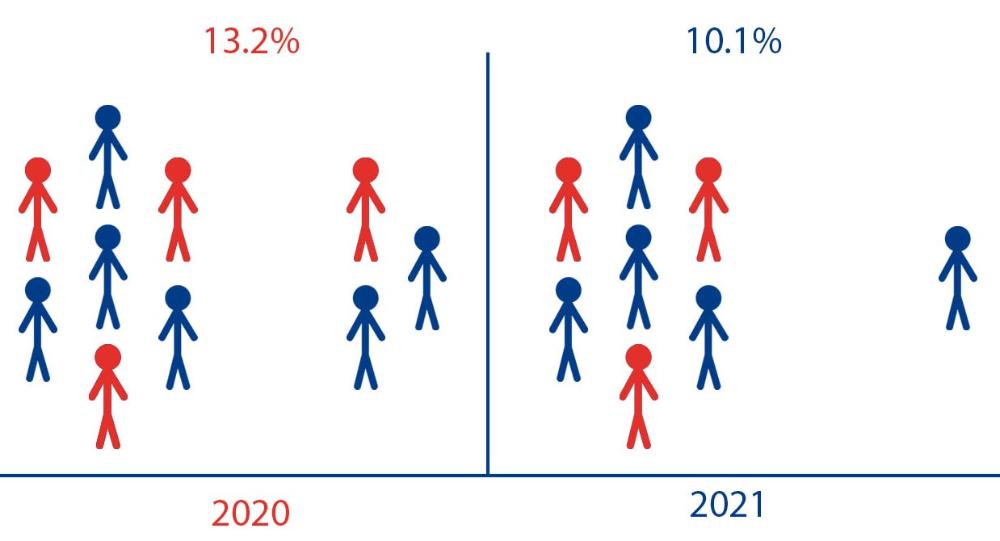
The employee survey in Europe in 2020 identified three areas in which local organizations should place greater focus: Digitalization, communication and employee development. To improve internal communication, Messer launched an international app in 2021: the “Beekeeper” app facilitates worldwide exchange between organizations and their teams: there are different streams for information, messages and files. Moreover, Beekeeper makes it possible to conduct anonymous and non-anonymous surveys, send out newsletters, and disseminate information campaigns. The Corporate Communications area was redesigned at the same time. Now it focuses more on content and in-house communications and is no longer organized according to communication channels. A “digital newsroom” reinforces cooperation with the communications officers in all companies.
Since the end of 2019, Messer Americas has been conducting surveys annually, in order to determine the needs and requirements of the workforce and to establish appropriate employee development programs. Their survey results from 2021 demonstrated indicators of employee engagement in the areas of company pride, safety and culture. The survey also provided employees an opportunity to express why diversity and inclusion (D&I) are important and what makes them most proud to work at Messer.
Satisfaction surveys
Messer conducts employee surveys in Europe and the Americas.
In Europe, 1,421 people participated in the survey; that represents 46 percent of the European workforce. The results point to an emphasis on work safety as well as a strong, committed corporate culture: 92 percent of respondents, for example, agreed that safety is the highest priority at Messer; 92 percent also indicated that they were satisfied with how Messer has handled the Covid-19 pandemic. 94 percent of participants said they were proud to work for Messer; and 89 percent agreed that they have a positive feeling about the direction in which Messer is headed. When asked to name three areas on which our local management is focusing greater attention, respondents identified employee development, communication and digitalization.
Since the end of 2019, Messer Americas has been conducting surveys at six-month intervals, in order to determine the needs and requirements of the workforce and to establish appropriate employee development programs. In the most recent survey at the end of 2020, 54 percent of employees in the Americas participated. As in Europe, the employees gave particularly positive assessments of the safety culture and pandemic management and also strongly agreed with the strategic direction and mission of the company.
New Purchasing Policy for Electricity
In the context of our Compliance Management System (CMS), a new Purchasing Policy for Electricity was adopted in 2021. It is designed to help minimize electricity costs for each air separation unit, negotiate the best possible contract terms, and make use of favorable market conditions when buying electricity. The policy applies to all consolidated Messer companies in Europe.
Change in the legal form of Messer
In 2021, Messer Group GmbH was transformed into a limited joint-stock partnership (KGaA) and has since traded under the name of Messer SE & Co. KGaA. The KGaA legal form allows us to ensure that Messer is geared to the future as a global group with enhanced operational and organizational scope. It ensures continued control and influence on the part of the shareholder family. The new legal form will allow the family’s fiscal and financial objectives to be achieved with even greater flexibility in future.
Over the next few years, the plan is to fully integrate Messer Industries GmbH, the joint venture created in 2019, into the family-owned company Messer SE & Co. KGaA. The development and implementation of a global strategy will then be possible for the merged industrial gases group. Furthermore, this will also facilitate the leveraging of some existing minor efficiency reserves.
The economic activity of Messer SE & Co. KGaA is mainly focused on Eastern Europe and Asia. The Asia region represents the world’s largest industrial gases market with the highest growth rates. Messer Industries has regional and product-specific business operations in North and South America as well as Western Europe. What unites them all is the focus on safety, customer orientation and profitable growth. We aim to achieve appropriate payment for our products through a team culture geared towards efficiency, success and motivation, a high level of employee and customer satisfaction as well as innovation.
China: New air separation unit for biotech customer in Chongqing
At the beginning of 2021, Messer concluded a gas supply contract with Calysseo (Chongqing) Co., Ltd., a joint venture between Adisseo, a global leader in the manufacture of feed additives for animal nutrition, and Calysta, a producer of alternative proteins. According to the provisions of the contract, Messer will build a new air separation unit for Calysseo as the world’s first large-scale FeedKind protein production facility, which will produce 20,000 metric tons of protein a year. The new air separation unit is due to go into operation at the beginning of 2023. Until then, Messer will, for the most part, supply oxygen and nitrogen to Calysseo by pipeline from an existing unit. This unit also has a liquid capacity – for the market in Chongqing – which will allow Messer to further strengthen its leading position.
China: Messer supports growth of lithium-ion battery industry for new energies
In China, Messer put an on-site nitrogen generator into operation at Hunan Yuneng New Energy Battery Materials Co., Ltd. (Yuneng) in Xiangtan, Hunan province. The remote-controlled on-site unit allows Messer to supply this major customer with nitrogen to support their long-term growth. Yuneng is China’s leading manufacturer of lithium iron phosphate (LFP), the cathode material for lithium-ion batteries. In mid-2021, Yuneng announced a five-fold increase of its capacities at the Xiangtan site and, at the same time, the construction of a new LFP plant in Anning, Yunnan province. At the moment, Messer is building another nitrogen generator there, which is scheduled to go into operation in the third quarter of 2022. Yuneng has been working with Messer since 2016. The new projects will further strengthen our strategic partnership.
Colombia: New nitrogen liquefier in Tocancipa
In Colombia, Messer is investing in a nitrogen liquefaction plant at the Tocancipa site, near the capital city of Bogotá, to expand its liquid capacities and meet the increasing demand for nitrogen in the region. The liquefier will supplement the existing air separation unit at the site.
Czech Republic: Market position in Central Europe further strengthened
Following the purchase of parts of Air Liquide Czech Republic, the acquired Air Liquide entity and Messer in the Czech Republic merged on January 1, 2021. An important component of the transaction was the takeover of a cylinder gas filling plant and an on-site oxygen production facility. Added to this are 60 bulk tanks installed on site for major customers as well as over 28,000 gas cylinders and 1,200 cylinder bundles acquired as part of the deal. In addition, Messer’s distribution network in the Czech Republic has grown by a further 38 Gas Centers.
Hungary: Nitrogen production facility for MOL
Messer built a facility for the production of nitrogen and compressed air for the petrochemical group MOL in Tiszaújváros. MOL is building a new polyol production plant in the eastern Hungarian town. Polyols are basic raw materials with a very wide range of uses in the chemical industry. Among other things, they are required for the production of polyurethane plastics. It is the biggest investment in MOL’s history; commissioning is planned for 2022. The new nitrogen and compressed air facility is the most efficient of its kind operated by Messer in Hungary. Messer already operates an air separation unit at the same site.
Serbia: New specialty gases plant in Pančevo’s industrial area
Messer commissioned a new specialty gases plant in Pančevo’s industrial area, further enhancing efficiency and capacity in this segment in Europe. The plant produces a wide range of high-purity gases, standard mixtures and individual gas mixtures. With high-quality specialty gases products, we meet the exacting requirements of our customers and make our contribution towards a greener living environment. The classic applications for high-purity gases and their mixtures include their use as test gases in research and development, in medicine and in measurement technology, for example for air purity. The new specialty gases plant directly adjoins the helium filling plant operated by Messer in Pančevo since 2011. This eliminates the need for the previous transportation routes to the former specialty gases site.
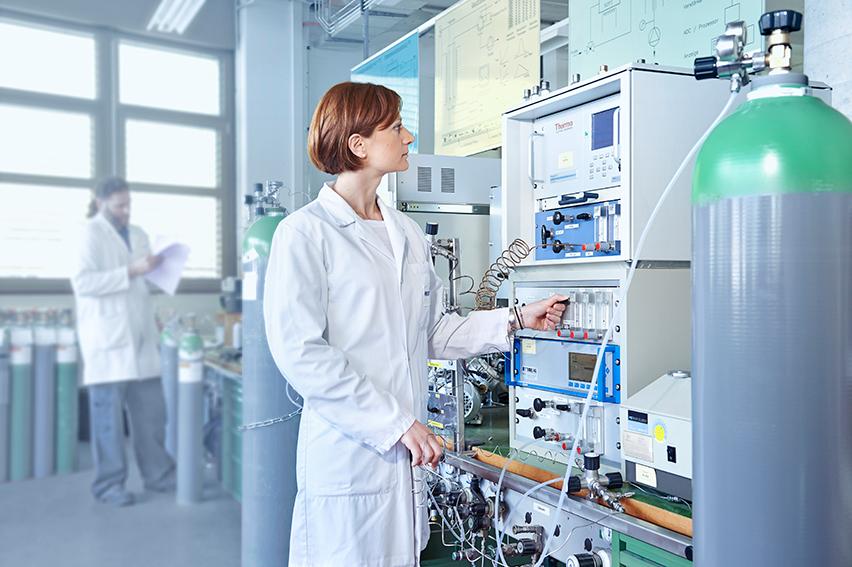
Slovenia: Automated filling in Črnuče
In April 2021, Messer commissioned a new filling plant in Črnuče, near the capital Ljubljana. It is equipped with state-of-the-art 300-bar filling technology which facilitates automatic control and monitoring of the filling process. The E-ccts customer cylinder tracking system is available for post-delivery tracking. It allows customers to follow cylinder movements in their own company and make a contribution to the sustainable circulation of “returnable cylinders”.
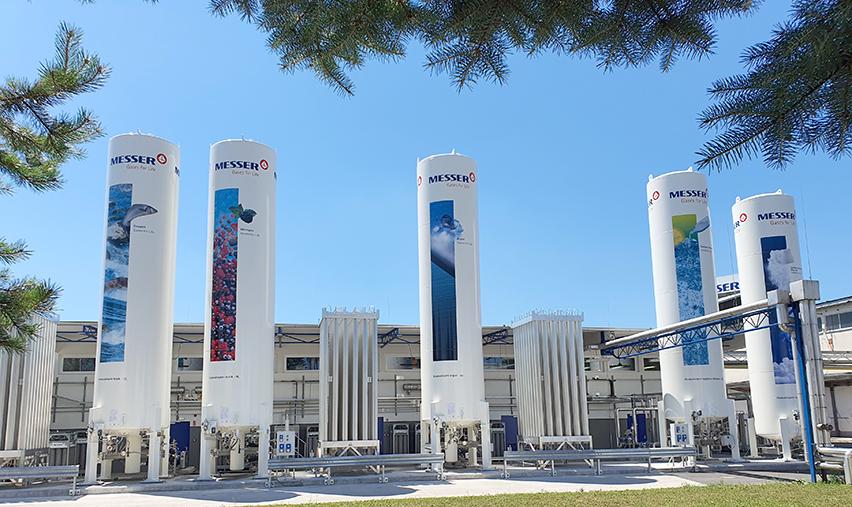
Switzerland: New filling and quality control facility
Existing premises at our Lenzburg site were completely renovated and repurposed for filling and quality control of specialty gases. For specialty gases filling, the facility now houses three universal filling stations, a bundle filling station, a filling stand for reactive and toxic gases as well as a ppb filling station. In addition, there is a separate weighing room. The quality control laboratory was also converted and re-equipped to meet current requirements. A further universal filling station is planned for expanded production in future.
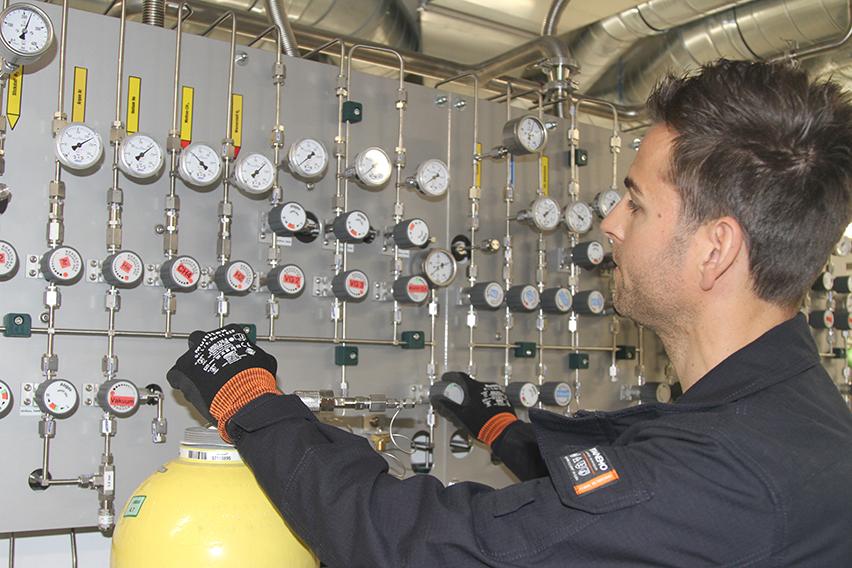
USA: New air separation unit strengthens market position in the Midwest
Messer and North Star BlueScope Steel (NSBS) agreed an increase in the supply capacities of gaseous oxygen in Delta, Ohio. NSBS is a leading manufacturer of hot-rolled sheet steel for the automotive, construction, energy and manufacturing sectors. Messer is investing in the construction of a new air separation unit (ASU) to increase the oxygen supply to 700 metric tons a day. This investment underlines our commitment in terms of expanding our on-site business in the U.S. while at the same time conducting a strategic expansion of our US bulk business. Apart from supplying NSBS, Messer will use the new ASU to expand its own liquid capacities in Delta and thereby increase growth and supply reliability for customers in the expanding market of the Midwest.
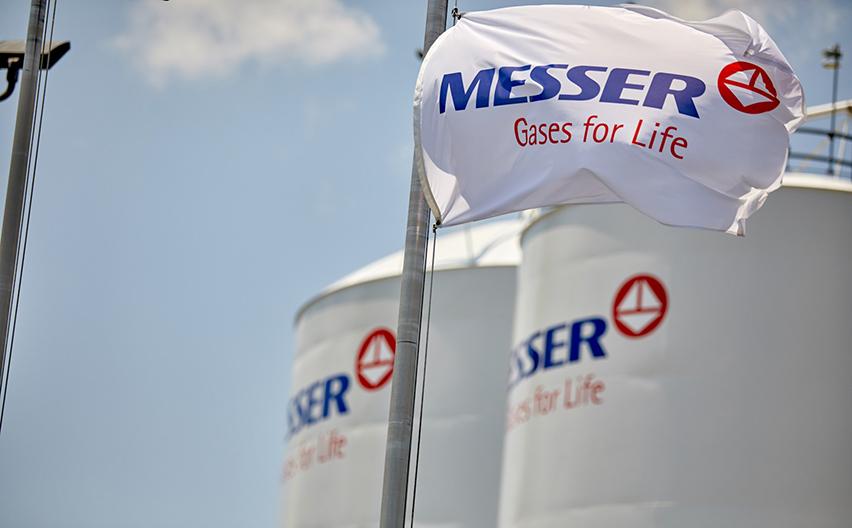
Vietnam: New air separation units for an expansion of Hoa Phat Dung Quat
Messer and its strategic long-term partner in Vietnam, the Hoa Phat Group, signed a new pipeline contract for the supply of oxygen, nitrogen and argon for an expansion of the Dung Quat steel complex. Hoa Phat’s new investment is aimed at significantly reducing Vietnam’s import of flat steel products and supporting the development of the local automotive and engineering industries. In addition to its three existing production facilities, Messer is investing in two new air separation units to supply Hoa Phat with sufficient gas volumes. Moreover, a new rare gas production unit is planned for the production of krypton, neon and xenon.
Switzerland: “Credit Rating Certificate” from Bisnode D&B Schweiz AG
In 2021, the credit agency Bisnode D&B Schweiz AG awarded a “Credit Rating Certificate” with “Risk Indicator 1” (which stands for minimum default risk) to Messer in Switzerland for the eleventh time in succession. Only two percent of all companies in Switzerland satisfy the conditions for this top rating. The certificate distinguishes Messer in Switzerland as a trustworthy, reliable, financially healthy and stable business partner.
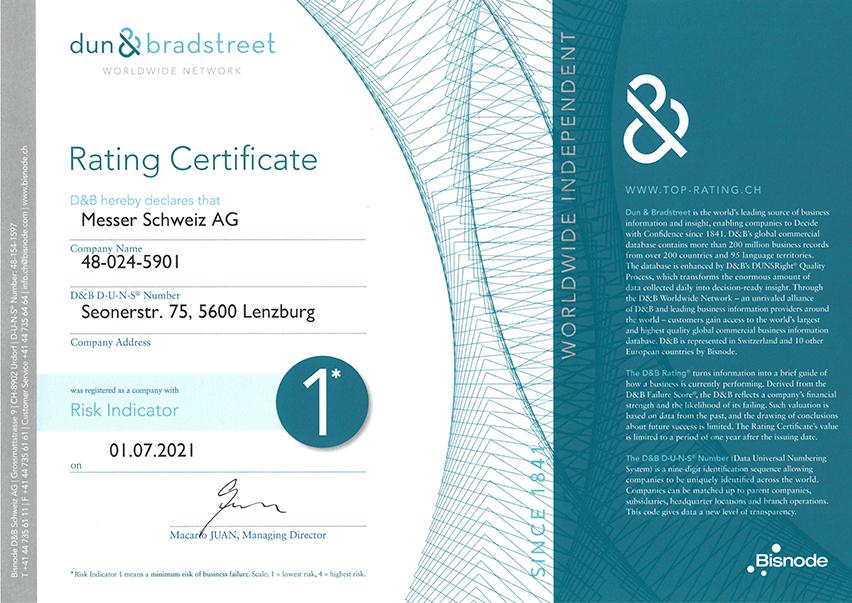
Brazil: Great Place to Work
For the fourth year in a row, Messer Brazil earned recognition from Great Place to Work! This award was based on the evaluation of Messer Brazil’s overall work environment, including respect for all in the workplace, pride, impartiality and business safety practices.
USA: Expanded hydrogen supply for car manufacturing plant
At a car manufacturing plant in Greer, South Carolina, Messer installed a redundant hydrogen supply system with high-capacity pumps and a 90,000-liter liquefied hydrogen tank. Messer has already been developing, installing, operating and maintaining the hydrogen supply and refueling infrastructure for the manufacturing plant since 2010. It supplies more than 700 forklifts and material handling vehicles today – one of the largest fleets of this type in the USA.
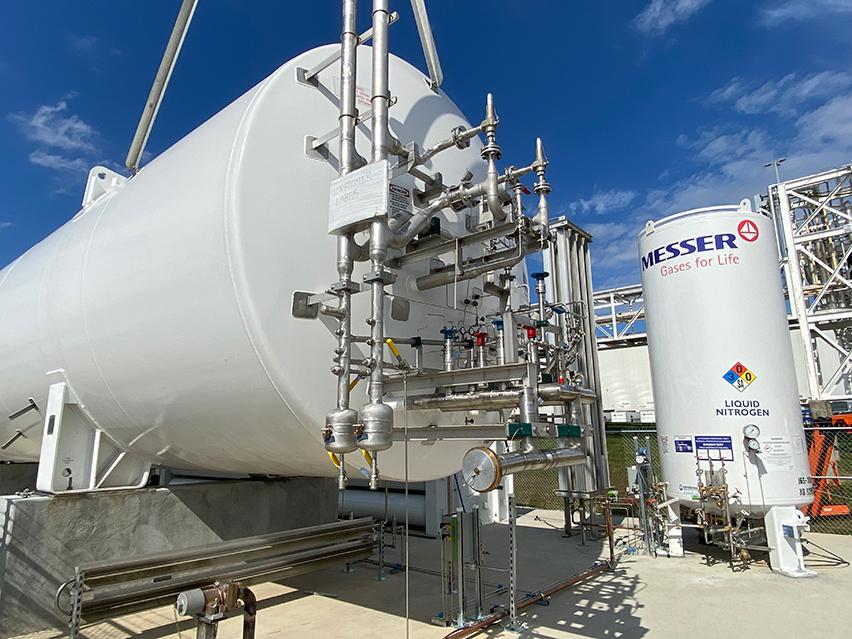
Canada: Remote maintenance for dry ice machine
To keep up with growing demand, a Canadian dry ice manufacturer raised its production capacity with the addition of a dry ice machine from ASCO. It can produce up to 400 kilograms of dry ice per hour in the form of slices or pellets. While setting up the machine and during the start-up phase, the Swiss ASCO team provided support to the Canadian customer via remote maintenance.


